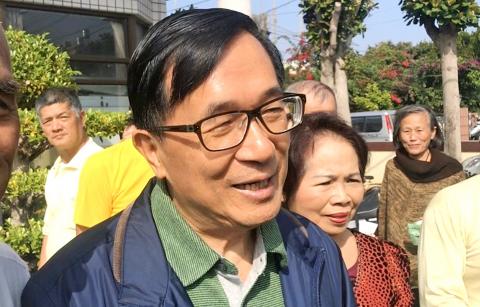Former president Chen Shui-bian (陳水扁), spiritual head of the Taiwan Action Party Alliance (TAPA), announced yesterday that he is withdrawing from politics and bid farewell to his supporters.
Chen, popularly known as “A-bian,” served as Taiwan’s president from 2000 to 2008.
He made the announcement in a statement after the party failed to win any seats in Saturday’s legislative elections.

Photo: Yen Hung-chun, Taipei Times
“I could not sleep last night and engaged in deep reflection,” Chen said.
“I fought the battle, but as the gardener of this small tree [TAPA], I feel it is beyond my ability to water, tend and watch it grow anymore,” he said.
“I am resigning, and would like to thank everyone for their support and votes, as well as those who have accompanied me from the very beginning to today,” Chen said.
TAPA, created by Chen with the backing of supporters of Taiwanese independence, was launched in Taipei on Aug. 18 last year.
The party advocates independence and seeks Taiwan’s entry into the UN.
In a video shown at the party’s launch, Chen said he believed that TAPA could secure 1 million votes in the legislative elections and win at least three seats or surpass the 5 percent threshold required for at-large seats.
Chen, embroiled in corruption scandals from his time as president, was first detained incommunicado on Nov. 12, 2008, and released on Dec. 13, 2008, after being charged.
He was detained again on Dec. 30, 2008, for nearly two years and after being sentenced to 20 years in prison on a series of corruption charges, began serving his sentence on Nov. 11, 2010.
Chen has maintained that his incarceration was the result of a political vendetta by the Chinese Nationalist Party (KMT) for his pro-independence views.
He was in prison until January 2015, when he was released on medical parole.
On Nov. 5 last year, Chen had his medical parole extended to Feb. 4 — the 20th time he has received an extension.

Chinese Nationalist Party (KMT) Chairman Eric Chu (朱立倫), spokeswoman Yang Chih-yu (楊智伃) and Legislator Hsieh Lung-chieh (謝龍介) would be summoned by police for questioning for leading an illegal assembly on Thursday evening last week, Minister of the Interior Liu Shyh-fang (劉世芳) said today. The three KMT officials led an assembly outside the Taipei City Prosecutors’ Office, a restricted area where public assembly is not allowed, protesting the questioning of several KMT staff and searches of KMT headquarters and offices in a recall petition forgery case. Chu, Yang and Hsieh are all suspected of contravening the Assembly and Parade Act (集會遊行法) by holding

PRAISE: Japanese visitor Takashi Kubota said the Taiwanese temple architecture images showcased in the AI Art Gallery were the most impressive displays he saw Taiwan does not have an official pavilion at the World Expo in Osaka, Japan, because of its diplomatic predicament, but the government-backed Tech World pavilion is drawing interest with its unique recreations of works by Taiwanese artists. The pavilion features an artificial intelligence (AI)-based art gallery showcasing works of famous Taiwanese artists from the Japanese colonial period using innovative technologies. Among its main simulated displays are Eastern gouache paintings by Chen Chin (陳進), Lin Yu-shan (林玉山) and Kuo Hsueh-hu (郭雪湖), who were the three young Taiwanese painters selected for the East Asian Painting exhibition in 1927. Gouache is a water-based

Taiwan would welcome the return of Honduras as a diplomatic ally if its next president decides to make such a move, Minister of Foreign Affairs Lin Chia-lung (林佳龍) said yesterday. “Of course, we would welcome Honduras if they want to restore diplomatic ties with Taiwan after their elections,” Lin said at a meeting of the legislature’s Foreign Affairs and National Defense Committee, when asked to comment on statements made by two of the three Honduran presidential candidates during the presidential campaign in the Central American country. Taiwan is paying close attention to the region as a whole in the wake of a

OFF-TARGET: More than 30,000 participants were expected to take part in the Games next month, but only 6,550 foreign and 19,400 Taiwanese athletes have registered Taipei city councilors yesterday blasted the organizers of next month’s World Masters Games over sudden timetable and venue changes, which they said have caused thousands of participants to back out of the international sporting event, among other organizational issues. They also cited visa delays and political interference by China as reasons many foreign athletes are requesting refunds for the event, to be held from May 17 to 30. Jointly organized by the Taipei and New Taipei City governments, the games have been rocked by numerous controversies since preparations began in 2020. Taipei City Councilor Lin Yen-feng (林延鳳) said yesterday that new measures by